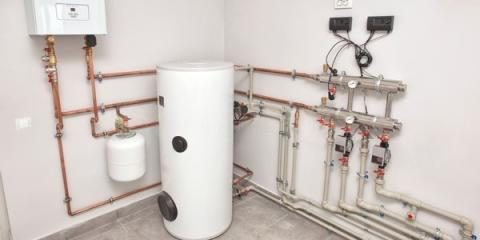When the winter chill sets in, having a reliable heating system is essential for maintaining comfort and warmth in your home. However, installing a heating system is not a simple task—it requires careful planning, proper sizing, and expert execution to ensure optimal performance and efficiency. In this comprehensive guide to heating system installation, we’ll walk you through everything you need to know to make informed decisions and achieve maximum comfort in your home.
Understanding Heating Systems
Types of Heating Systems
Heating systems come in various types, each with its advantages and applications. Common options include furnaces, boilers, heat pumps, and ductless mini-split systems. Furnaces use forced-air distribution to heat your home, while boilers heat water to provide radiant heat. Heat pumps offer both heating and cooling capabilities, while ductless mini-split systems provide targeted heating to specific areas of your home.
Energy Efficiency Ratings
When choosing a heating system, it’s essential to consider energy efficiency ratings such as AFUE (Annual Fuel Utilization Efficiency) for furnaces and SEER (Seasonal Energy Efficiency Ratio) for heat pumps. Higher efficiency ratings indicate greater energy savings and lower operating costs over time.
Choosing the Right System for Your Home
Selecting the right heating system for your home involves considering factors such as climate, fuel availability, home size, and budget. A professional HVAC contractor can help assess your needs and recommend the most suitable system for your specific requirements.
Preparing for Installation
Sizing and Load Calculation
Proper sizing is critical for ensuring the efficiency and effectiveness of your heating system. HVAC professionals use load calculation methods to determine the appropriate size of the heating equipment needed to adequately heat your home without wasting energy or compromising comfort.
Ductwork Inspection and Repair
Before installing a new heating system, it’s essential to inspect and, if necessary, repair your home’s ductwork. Leaky or damaged ducts can result in energy loss and reduced system performance. Sealing and insulating ductwork can improve efficiency and airflow throughout your home.
Permits and Regulations
Obtaining the necessary permits and ensuring compliance with local building codes and regulations is an essential step in the heating system installation process. HVAC contractors should be familiar with local requirements and handle permit applications on behalf of homeowners.
The Installation Process
Site Preparation
Preparing the installation site involves removing old equipment, clearing space for new components, and protecting flooring and furniture from damage during the installation process. Proper site preparation ensures a smooth and efficient installation process.
Equipment Installation
During the installation phase, HVAC technicians will install the heating equipment, including connecting ductwork, piping, wiring, and venting. Attention to detail and adherence to manufacturer specifications are essential for ensuring safe and reliable operation.
System Testing and Calibration
Once the equipment is installed, technicians will conduct thorough testing and calibration to verify proper operation and performance. This may include checking airflow, verifying temperature settings, and adjusting controls as needed to optimize system efficiency.
Post-Installation Maintenance and Care
System Startup and Adjustment
After installation, HVAC technicians will start up the heating system and make any necessary adjustments to ensure optimal performance. This may include fine-tuning settings, adjusting airflow, and verifying the proper operation of all components.
Regular Maintenance Tasks
Regular maintenance is key to prolonging the life of your heating system and maximizing efficiency. Homeowners should perform tasks such as filter replacement, duct cleaning, and thermostat calibration regularly to keep their systems running smoothly.
Troubleshooting Common Issues
Despite proper installation and maintenance, heating systems may encounter occasional issues. Homeowners should familiarize themselves with common problems such as uneven heating, strange noises, and reduced airflow, and know when to contact a professional for assistance.
Benefits of Professional Installation
Expertise and Experience
Professional HVAC technicians have the expertise and experience to ensure proper heating system installation. They understand the intricacies of different system types and can recommend the best solutions for your home.
Warranty Coverage
Many reputable HVAC companies offer warranty coverage for parts and labor on newly installed heating systems. This provides homeowners with added peace of mind knowing that their investment is protected against unexpected repairs or failures.
Long-Term Savings
While professional installation may come with an upfront cost, it can lead to long-term savings through improved energy efficiency and reduced maintenance and repair expenses. A properly installed heating system will operate more efficiently, saving you money on utility bills over time.
Financing Options and Incentives
Financing Programs
To help homeowners afford the upfront cost of heating system installation, financing programs such as equipment financing, low-interest loans, and flexible payment plans are available. These options make it easier to budget for and afford your new heating system.
Energy Efficiency Incentives
Many utility companies, local governments, and federal programs offer energy efficiency incentives and rebates to encourage homeowners to upgrade to high-efficiency heating systems. These incentives can help offset the cost of installation and provide additional savings over time.
Return on Investment (ROI) Analysis
Before investing in a new heating system, homeowners should conduct a return on investment (ROI) analysis to evaluate the long-term financial benefits. Factoring in energy savings, rebates, and potential increases in home value can help determine the overall value of the investment.
Choosing the Right Contractor
Credentials and Certifications
When selecting a contractor for heating system installation, it’s essential to choose a licensed, bonded, and insured HVAC professional with the necessary credentials and certifications. This ensures that the work is performed to industry standards and meets regulatory requirements.
Reputation and Reviews
Researching a contractor’s reputation and reading reviews from past customers can provide valuable insight into their quality of work and customer service. Online review platforms and testimonials from friends and family can help homeowners make informed decisions.
Written Estimates and Contracts
Before hiring a contractor, homeowners should obtain written estimates and contracts from multiple candidates. These documents should outline the scope of work, pricing, warranty information, and any terms and conditions to ensure transparency and protect both parties.
Frequently Asked Questions (FAQs)
What factors should I consider when choosing a heating system for my home?
Consider factors such as your home’s size, climate, existing infrastructure (such as ductwork), fuel availability, budget, and energy efficiency ratings of different heating systems.
Do I need to replace my heating system if it’s still working, but old?
While older heating systems may still function, they are often less efficient and may cost more to operate. Consider upgrading to a newer, more efficient system to save on energy costs and improve comfort.
How long does it take to install a new heating system?
The installation time varies depending on factors such as the type of system, the complexity of the installation, and any necessary preparatory work. On average, a heating system installation can take anywhere from a few days to a week.
Do I need to hire a professional contractor for heating system installation?
It’s highly recommended to hire a professional HVAC contractor for heating system installation. They have the expertise, experience, and tools necessary to ensure the installation is done correctly and safely.
What type of maintenance does a new heating system require?
Regular maintenance is essential for ensuring the efficiency and longevity of your heating system. Tasks may include replacing filters, cleaning ductwork, inspecting components for wear and tear, and scheduling professional tune-ups.
What are the benefits of upgrading to a high-efficiency heating system?
High-efficiency heating systems offer several benefits, including lower energy bills, improved comfort, reduced environmental impact, and potential rebates or incentives from utility companies and government programs.
How can I finance a new heating system installation?
Financing options for heating system installation may include equipment financing, low-interest loans, flexible payment plans, and energy efficiency incentives and rebates from utility companies and government programs.
What should I look for when hiring a contractor for heating system installation?
Look for contractors who are licensed, bonded, insured, and have the necessary credentials and certifications. Research their reputation, read reviews from past customers, and obtain written estimates and contracts before making a decision.
How can I ensure my heating system is properly sized for my home?
Proper sizing is crucial for ensuring the efficiency and effectiveness of your heating system. Work with an HVAC contractor who can perform load calculations to determine the appropriate size of the system based on factors such as square footage, insulation levels, and climate.
What should I do if I experience problems with my new heating system after installation?
Contact your HVAC contractor immediately if you experience any issues with your new heating system. They can diagnose and resolve the problem quickly to ensure your comfort and safety.
Conclusion
A properly installed heating system is essential for maintaining comfort and warmth in your home during the cold winter months. By understanding the heating system installation process, preparing adequately, and choosing the right contractor, homeowners can ensure a smooth and successful installation experience. With proper maintenance and care, a high-efficiency heating system can provide years of reliable performance and energy savings, making it a valuable investment in your home’s comfort and value.






